21世纪大学实用英语综合教程(第二册第1-4单元)-PPT文档
- 格式:ppt
- 大小:342.00 KB
- 文档页数:25
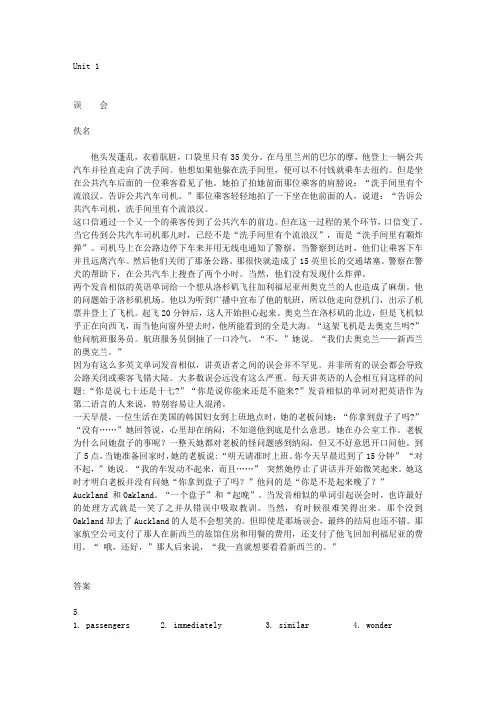
Unit 1误会佚名他头发蓬乱,衣着肮脏,口袋里只有35美分。
在马里兰州的巴尔的摩,他登上一辆公共汽车并径直走向了洗手间。
他想如果他躲在洗手间里,便可以不付钱就乘车去纽约。
但是坐在公共汽车后面的一位乘客看见了他。
她拍了拍她前面那位乘客的肩膀说:“洗手间里有个流浪汉。
告诉公共汽车司机。
”那位乘客轻轻地拍了一下坐在他前面的人,说道:“告诉公共汽车司机,洗手间里有个流浪汉。
这口信通过一个又一个的乘客传到了公共汽车的前边。
但在这一过程的某个环节,口信变了。
当它传到公共汽车司机那儿时,已经不是“洗手间里有个流浪汉”,而是“洗手间里有颗炸弹”。
司机马上在公路边停下车来并用无线电通知了警察。
当警察到达时,他们让乘客下车并且远离汽车。
然后他们关闭了那条公路。
那很快就造成了15英里长的交通堵塞。
警察在警犬的帮助下,在公共汽车上搜查了两个小时。
当然,他们没有发现什么炸弹。
两个发音相似的英语单词给一个想从洛杉矶飞往加利福尼亚州奥克兰的人也造成了麻烦。
他的问题始于洛杉矶机场。
他以为听到广播中宣布了他的航班,所以他走向登机门,出示了机票并登上了飞机。
起飞20分钟后,这人开始担心起来。
奥克兰在洛杉矶的北边,但是飞机似乎正在向西飞,而当他向窗外望去时,他所能看到的全是大海。
“这架飞机是去奥克兰吗?”他问航班服务员。
航班服务员倒抽了一口冷气,“不,”她说。
“我们去奥克兰——新西兰的奥克兰。
”因为有这么多英文单词发音相似,讲英语者之间的误会并不罕见。
并非所有的误会都会导致公路关闭或乘客飞错大陆。
大多数误会远没有这么严重。
每天讲英语的人会相互问这样的问题:“你是说七十还是十七?”“你是说你能来还是不能来?”发音相似的单词对把英语作为第二语言的人来说,特别容易让人混淆。
一天早晨,一位生活在美国的韩国妇女到上班地点时,她的老板问她:“你拿到盘子了吗?” “没有……”她回答说,心里却在纳闷,不知道他到底是什么意思。
她在办公室工作。
老板为什么问她盘子的事呢?一整天她都对老板的怪问题感到纳闷,但又不好意思开口问他。
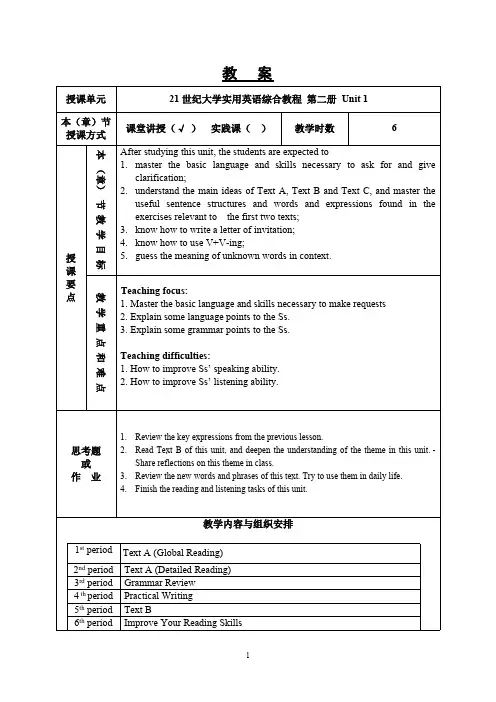
教案授课单元21世纪大学实用英语综合教程第二册Unit 1本(章)节授课方式课堂讲授(√)实践课()教学时数6本(章)节教学目标After studying this unit, the students are expected to1.master the basic language and skills necessary to ask for and giveclarification;2.understand the main ideas of Text A, Text B and Text C, and master theuseful sentence structures and words and expressions found in the exercises relevant to the first two texts;3.know how to write a letter of invitation;4.know how to use V+V-ing;5.guess the meaning of unknown words in context.授课要点教学重点和难点Teaching focus:1. Master the basic language and skills necessary to make requests2. Explain some language points to the Ss.3. Explain some grammar points to the Ss.Teaching difficulties:1. How to improve Ss’ speaking ability.2. How to improve Ss’ listening ability.思考题或作业1.Review the key expressions from the previous lesson.2.Read Text B of this unit, and deepen the understanding of the theme in this unit. -Share reflections on this theme in class.3.Review the new words and phrases of this text. Try to use them in daily life.4.Finish the reading and listening tasks of this unit.教学内容与组织安排1st period Text A (Global Reading)2nd period Text A (Detailed Reading)3rd period Grammar Review4 th period Practical Writing5th period Text B6th period Improve Your Reading Skills1st period Text A (Global Reading)1 Background InformationEnglish LanguageThe English language is the most widely spoken language in the world. It is used as either a primary or secondary language in many countries.During the 1500s, fewer than 2 million people spoke English. All of them lived in what is now Great Britain. Through the centuries, as the result of various historical events, English spread throughout the world. Today, about 400 million people speak English as their native language. Most of them live in Australia, Canada, Great Britain, Ireland, New Zealand, South Africa, and the United States.Another 100 million people living chiefly in Bangladesh, India, Pakistan, and in many African countries speak English in addition to their own language. An additional 200 million people probably know at least some English. (From the 1998 World Book Multimedia Encyclopedia)Characteristics of EnglishVocabulary. English has a larger vocabulary than any other language. There are more than 600,000 words in the largest dictionaries of the English language.Some English words have been passed on from generation to generation as far back as scholars can trace. These words, such as woman, man, sun, hand, love, go, and eat, express basic ideas and feelings. Later, many words were borrowed from other languages, including Arabic, French, German, Greek, Italian, Latin, Russian, and Spanish. For example, algebra is from Arabic, fashion from French, piano from Italian, and canyon from Spanish.A number of words, such as doghouse and splashdown, were formed by combining other words. New words were also created by blending words. For example, motor and hotel were blended into motel. Words can be shortened to form new words, as was done with history to form story. Words called acronyms are formed by using the first letter or letters of several words. The word radar is an acronym for radio detection and ranging.Pronunciation and spelling in English sometimes seem illogical or inconsistent. Many words are spelled similarly though pronounced differently. Examples include cough, though, and through. Other words, such as blue, crew, to, too, and shoe, have similar pronunciations but are spelled differently. Many of these variations show changes that occurred during the development of English. The spelling of some words remained the same through the centuries, though their pronunciation changed.Grammar is the set of principles used to create sentences. These principles define the elements used to assemble sentences and the relationships between the elements. The elements include parts of speech and inflections.Parts of speech are the word categories of the English language. Scholars do not all agree on how to describe the parts of speech. The traditional description listseight classes: nouns, pronouns, verbs, adjectives, adverbs, prepositions, conjunctions, and interjections. The most important relationships of the parts of speech include subject and verb, verb and predicate, and modifier and the word modified.English has fewer inflections than most other European languages. An English noun has only two inflections, the plural and the possessive. Inflections are used to change the tense and number of a verb or the case of a pronoun. Inflections can change adjectives to the comparative or the superlative — for example, big, bigger, biggest.American EnglishAmerican English is a variety of the English language spoken in the United States. Although all Americans do not speak the same way, their speech has enough in common that American English can be recognized as a variety of English distinct from British English, Australian English, and other national varieties. American English has grown up with the country. It began to diverge from British English during its colonial beginnings and acquired regional differences and ethnic flavor during the settlement of the continent.Today it influences other languages and other varieties of English because it is the medium by which the attractions of American culture — its literature, motion pictures, and television programs — are transmitted to the world.Characteristics of American EnglishA. PronunciationIn broad terms, Canadian and American speakers tend to sound like one another. They also tend to sound different from a large group of English speakers who sound more British, such as those in Australia, New Zealand, and South Africa. For example, most Canadians and Americans pronounce an r sound after the vowel in words like barn, car,and farther, while speakers from the British English group do not. Also, some British English speakers drop h sounds at the beginning of words, so that he and his are pronounced as if they were spelled ee and is. The English spoken in Australia, New Zealand, and South Africa sounds more like British English than American English does because these varieties have had less time to diverge from British English. The process of separate development began later in these countries than in North America.In some cases there are differences between American English and British English in the rhythm of words. British speakers seem to leave out a syllable in words like secretary, as if it were spelled secretry, while Americans keep all the syllables. The opposite is true of other words, such as specialty, which Americans pronounce with three syllables (spe-cial-ty) while British speakers pronounce it with five syllables (spe-ci-al-i-ty). Vowels and consonants may also have different pronunciations. British speakers pronounce zebra to rhyme with Debra, while American speakers make zebra rhyme with Libra. Canadian and British speakers pronounce the word schedule as if it began with an sh sound, while Americans pronounce it as if it began with an sk sound.B. WordsThe most frequently used words are shared by speakers of different varieties of English. These words include the most common nouns, the most common verbs, and most function words (such as pronouns, articles, and prepositions). The different varieties of English do, however, use different words for many words that are slightly less common — for example, British crisps for American potato chips, Australian billabong for American pond, and Canadian chesterfield for American sofa. It is even more common for the same word to exist with different meanings in different varieties of English.Corn is a general term in Britain, for which Americans use grain, while corn in American English is a specific kind of grain. The word pond in British English usually refers to an artificial body of water, whereas ponds also occur naturally in North America. British English chemist is the same as American English drugstore, and in Canada people go to the druggist. Many of the words most easily recognized as American in origin are associated with aspects of American popular culture, such as gangster or cowboy.C. SpellingAmerican English spelling differs from British English spelling largely because of one man, American lexicographer Noah Webster. In addition to his well-known An American Dictionary of the English Language (1828), Webster published The American Spelling Book (1783, with many subsequent editions), which became one of the most widely used schoolbooks in American history. Webster’s books sought to standardize spelling in the United States by promoting the use of an American language that intentionally differed from British English. The development of a specifically American variety of English mirrored the newcountry’s separate political development. Webster’s most successful changes were spellings with or instead of our (honor, labor for the British honour, labour); with er instead of re (center, theater for the British centre, theatre); with an s instead of a c (defense, license for the British defence, licence); with a final ck instead of que (check, mask for the British cheque, masque); and without a final k (traffic, public, now also used in British English, for the older traffick, publick). Later spelling reform created a few other differences, such as program for British programme. Canadian spelling varies between the British and American forms, more British in eastern Canada and more American in western Canada.2. Group DiscussionHave you ever had an experience in which you are misunderstood or have failed to understand others? Misunderstandings can result from the spoken form or written form of the language that you use.2nd period Text A (Detailed Reading)Words and Expressions & Difficult Sentences1) misunderstanding: n. (an example of) wrong understanding 误解,误会e.g. Her poor French often leads to misunderstandings when she visits France. misunderstand: vt. understand wrongly 误解e.g. I’m sorry, I misunderstood you.It seems that you have misunderstood what I said at the meeting.2) get on: board (a bus, a train, etc.)登上(公共汽车、火车等)e.g. When I got on the bus, I found all the seats were occupied.They felt worried when they realized that they had got on the wrong train.3) head for: go towards 向…走去;朝…行进e.g. The ship was heading for Britain.He headed for the bus stop.4) … he could ride to New York without paying.介词without 解释为“不、未”,其后跟动词时,须用V-ing形式。
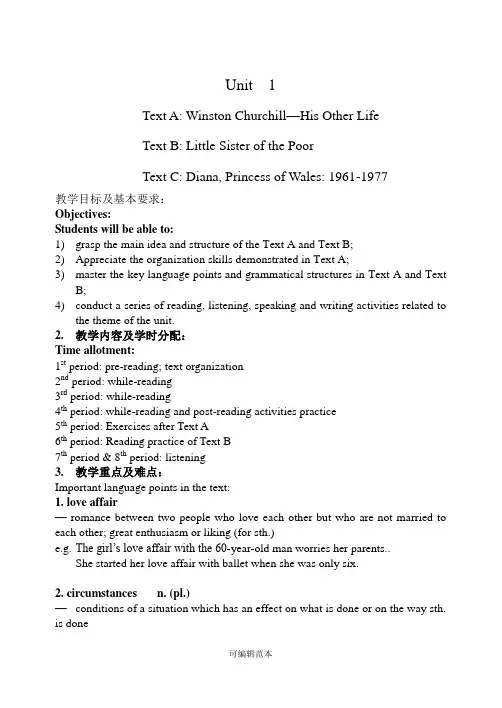
Unit 1Text A: Winston Churchill—His Other LifeText B: Little Sister of the PoorText C: Diana, Princess of Wales: 1961-1977教学目标及基本要求:Objectives:Students will be able to:1)grasp the main idea and structure of the Text A and Text B;2)Appreciate the organization skills demonstrated in Text A;3)master the key language points and grammatical structures in Text A and TextB;4)conduct a series of reading, listening, speaking and writing activities related tothe theme of the unit.2. 教学内容及学时分配:Time allotment:1st period: pre-reading; text organization2nd period: while-reading3rd period: while-reading4th period: while-reading and post-reading activities practice5th period: Exercises after Text A6th period: Reading practice of Text B7th period & 8th period: listening3. 教学重点及难点:Important language points in the text:1. love affair— romance between two people who love each other but who are not married to each other; great enthusiasm or liking (for sth.)e.g. The girl’s love affair with the 60-year-old man worries her parents..She started her love affair with ballet when she was only six.2. circumstances n. (pl.)—conditions of a situation which has an effect on what is done or on the way sth. is donee.g. In some circumstances it may be necessary for the manager to come here in person.Even under the most favorable circumstances this is not easy.3. mission n.—an important job sb. is sent to do in another place, esp. for a military or political purposee.g. The foreign minister’s missi on to Paris is to negotiate a cease-fire.It is his sole mission to expand the company’s business abroad.4.price n.—what must be given, done, or undergone to obtain or compensate for sth.e.g. We paid a heavy price for the victory, for we lost 10,000 soldiers.Translate : This is a small price to pay for independence.Key: 这是为独立付出的小小代价。

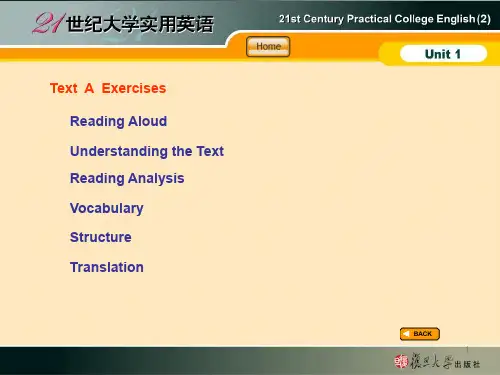

21世纪大学实用英语综合教程(第二册)___________________________________________________UNIT 1误会他头发蓬乱,衣着肮脏,口袋里只有35美分。
在马里兰州的巴尔的摩,他登上一辆公共汽车并径直走向了洗手间。
他想如果他躲在洗手间里,便可以不付钱就乘车去纽约。
但是坐在公共汽车后面的一位乘客看见了他。
她拍了拍她前面那位乘客的肩膀说:“洗手间里有个流浪汉。
告诉公共汽车司机。
”那位乘客轻轻地拍了一下坐在他前面的人,说道:“告诉公共汽车司机,洗手间里有个流浪汉。
这口信通过一个又一个的乘客传到了公共汽车的前边。
但在这一过程的某个环节,口信变了。
当它传到公共汽车司机那儿时,已经不是“洗手间里有个流浪汉”,而是“洗手间里有颗炸弹”。
司机马上在公路边停下车来并用无线电通知了警察。
当警察到达时,他们让乘客下车并且远离汽车。
然后他们关闭了那条公路。
那很快就造成了15英里长的交通堵塞。
警察在警犬的帮助下,在公共汽车上搜查了两个小时。
当然,他们没有发现什么炸弹。
两个发音相似的英语单词给一个想从洛杉矶飞往加利福尼亚州奥克兰的人也造成了麻烦。
他的问题始于洛杉矶机场。
他以为听到广播中宣布了他的航班,所以他走向登机门,出示了机票并登上了飞机。
起飞20分钟后,这人开始担心起来。
奥克兰在洛杉矶的北边,但是飞机似乎正在向西飞,而当他向窗外望去时,他所能看到的全是大海。
“这架飞机是去奥克兰吗?”他问航班服务员。
航班服务员倒抽了一口冷气,“不,”她说。
“我们去奥克兰——新西兰的奥克兰。
”因为有这么多英文单词发音相似,讲英语者之间的误会并不罕见。
并非所有的误会都会导致公路关闭或乘客飞错大陆。
大多数误会远没有这么严重。
每天讲英语的人会相互问这样的问题:“你是说七十还是十七?”“你是说你能来还是不能来?”发音相似的单词对把英语作为第二语言的人来说,特别容易让人混淆。
一天早晨,一位生活在美国的韩国妇女到上班地点时,她的老板问她:“你拿到盘子了吗?”“没有……”她回答说,心里却在纳闷,不知道他到底是什么意思。

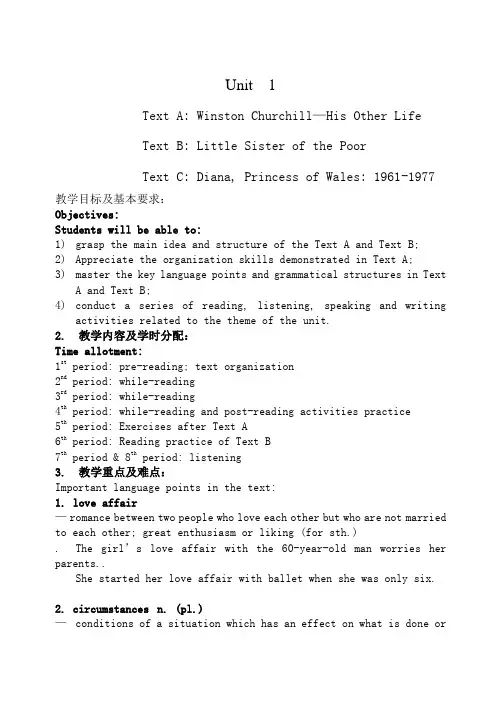
Unit 1Text A: Winston Churchill—His Other LifeText B: Little Sister of the PoorText C: Diana, Princess of Wales: 1961-1977教学目标及基本要求:Objectives:Students will be able to:1)grasp the main idea and structure of the Text A and Text B;2)Appreciate the organization skills demonstrated in Text A;3)master the key language points and grammatical structures in TextA and Text B;4)conduct a series of reading, listening, speaking and writingactivities related to the theme of the unit.2. 教学内容及学时分配:Time allotment:1st period: pre-reading; text organization2nd period: while-reading3rd period: while-reading4th period: while-reading and post-reading activities practice5th period: Exercises after Text A6th period: Reading practice of Text B7th period & 8th period: listening3. 教学重点及难点:Important language points in the text:1. love affair—romance between two people who love each other but who are not married to each other; great enthusiasm or liking (for sth.). The girl’s love affair with the 60-year-old man worries her parents..She started her love affair with ballet when she was only six.2. circumstances n. (pl.)—conditions of a situation which has an effect on what is done oron the way sth. is done. In some circumstances it may be necessary for the manager to come here in person.Even under the most favorable circumstances this is not easy.3. mission n.—an important job sb. is sent to do in another place, esp. for a military or political purpose. The foreign minister’s mission to Par is is to negotiate a cease-fire.It is his sole mission to expand the company’s business abroad.4.price n.—what must be given, done, or undergone to obtain or compensate for sth.. We paid a heavy price for the victory, for we lost 10,000 soldiers. Translate : This is a small price to pay for independence.Key: 这是为独立付出的小小代价。
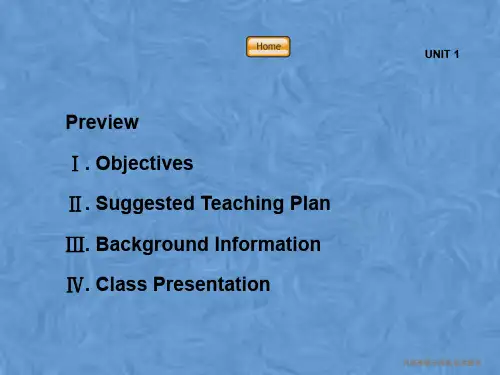

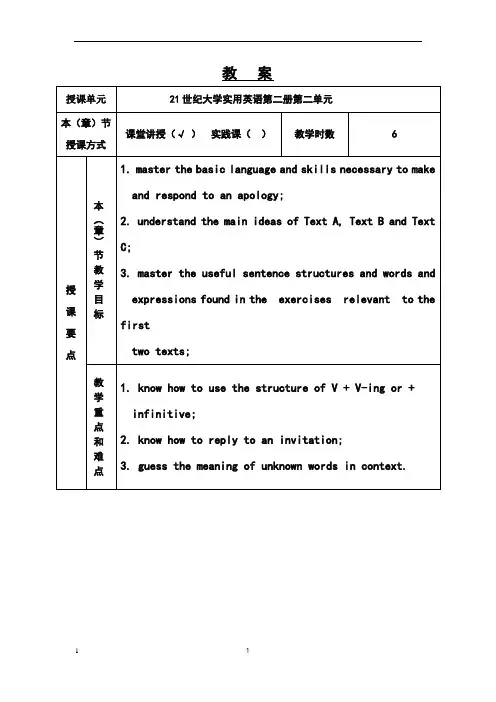
教案Teaching procedures:First PeriodContent:Unit 2 listening and speakingStep 1 Lead-inIn the Listening and Speaking section, you will learn the basic language and skills necessary to make and respond to an apology;Step 2 Listening and Speaking1) The Language for Making and Responding to an ApologyA. have a warm-up activity by asking Ss what they say when they cause trouble to others or make mistakes;B. have the Ss listen to Exercise 1 (1-3 times) and fill in the blanks with the missing words;C. ask one S to read aloud the talk so Ss can check their completed answers;D. ask other Ss to form responses to the apologies in Exercise2. trying to use the expression learned in Exercise 1.2) Making and Responding to an ApologyA.go through the new words in the 1st dialogue in Exercise 3;B. listen to the dialogue twice while filling in the missing words;C.ask Ss to answer the questions about the conversation by way of group discussion or the traditional teacher- student interaction;D.have them look for the language used to make and respond to an apology;E. Ss can role-play the dialogue;F. do the same with the second dialogueStep 3 Ask Ss to study the structures presented in Exercise 4, and create situations for dialogues in which Ss blame someone for his/her mistake or fault and expect them to make both apologies and excuses with the help of the language they have picked up in Exercise 1 and expressions from Exercise 4.Step 4 Listening PracticeA.Listen to the following people speaking and decide what they are talking about. (Each one will be given twice.)B Listen to the following five short dialogues and choose the appropriate answers.(Each one will be given twice.)C.Listen to the following short story twice. Listen carefully and decide whether the statements are true (T) or false (F) according to the story you have heard.D.Listen to the following talk and fill in the blanks with the missing words. (The talk is given twice.)E. Listen to the talk again and then answer the following questions orally.Answers to the listening practice5. C A D A B6. C A B D C7. T T F F T8. in a loud voice particularly interesting in the same room in curing them left alone a talk suffering from a delusion who are youStep 6 SummaryThere’re many ways of making an apology:—Excuse me for my interrupting you.—I’m really sorry for being late.—I’m terribly sorry to step on you.—I’ m awfully sorry (that) I have forgetten your name.— I apologize for what I have said.—I’m afraid I seem to have forgetten your birthday.— I owe you an apology for the delay.—I’m sorry. I didn’t mean to hurt your felling.— It was really quite unintentional.— I hope you excuse me.There are also many ways of responding to an apology:—That’s (quite) all right.—These things happen; it can’t be helped.—I quite understand. Please don’t worry.— (Oh well.) Not to worry.—No problem. Let’s forget it.Step 7 Homework assignment1. Form a dialogue with your classmates.2. preview the new lesson.Second PeriodContent:Unit 2 Text AStep1 Lead-in1. Have you ever been mistaken for someone else Or do you know someone who has been mistaken for another person Please share your story with your classmates.2. Now imagine you have the same name as the mayor of your city and look like him too. What might happen when you go to a hotel asking for a room and are told that the rooms are all bookedStep 2 Ask Ss to read the following passage and see what happened to Mark Twain when he tried to get a train ticket.Step 3 Introduce the Background InformationMark Twain (1835-1910)Mark Twain was the pen name of Samuel Langhorne Clemens, one of the major authors of American fiction. Twain is also considered the greatest humorist in American literature. Twain’s varied works include novels, travel narratives, short stories, sketches, and essays. His writings about the Mississippi River, such as The Adventures of Tom Sawyer, Life on the Mississippi, and Adventures of Huckleberry Finn, have been especially popular among modern readers. (From the 1998 World Book Encyclopedia)v1.0 可编辑可修改7-Eleven7-Eleven, Inc. is the world’s largest operator, franchiser and licensor of convenience stores with more than 24,000 units worldwide. Founded in Dallas, Texas in 1927 as an ice company, 7-Eleven pioneered the convenience store concept during its early years when its ice docks began selling milk, bread and eggs as a convenience to customers.The name 7-Eleven originated in 1946 when the stores were open from 7 a.m. until 11 . Today, offering customers 24hour convenience, seven days a week is the cornerstone of 7-Eleven’s business. Approximately 5,800 7-Eleven and other convenience stores are operated and franchised in the United States and Canada.Step 4 Listen to the whole text and answer some questions about the text.Step 5 Deal with some languages points1) I was to take the sleeper train there: I planned to take the sleeper train there.我计划在那儿搭乘卧车。
21世纪大学实用英语综合教程第二册答案1~5单元含听力答案,原文翻译A 21世纪大学实用英语综合教程第二册答案1~5 Unit1.Listening & Speaking1, what has been said, mentioned earlier, two-way interaction, a breakdown, even confusion, a native speaker, going on3, 1), be fun, I don’t think, it depends, What’s that, what you mean, got it, what would you say;Tom Chang.It depends.He’ll tell them a little white lie.It’s an innocent social fib or excuse.Not mentioned.2), serious hearing problems, to hear 100%, is perfect, hear again, listen to the conversations, three times;What did you say? Would you speak louder please?No. I’ve been having serious hearing problems for years. I can’t hear people well. That’s why I’m here.What do you m ean by hearing aid? What’s that?Oh, I haven’t told my family yet. I just sit around and listen to the c onversations. You know what? I’ve changed my will three times!5, BADCA 6, DACCB 7, FTTFF8, complaining about, does everything, every 10 hours, every 2 hours, every 24 hours, in one hour, damn near, from down the hall, I just realized9, They are talking about Nurse Nancy.Because she did everything absolutely backwards.1)One doctor told her to give a patient 2 milligrams ofmorphine every 10 hours. She gave him 10 milligrams every 2 hours.2)The other doctor told her to give a petient an enema every 24 hours. She tried to give him 24 enemas in one hour.They heard a blood-curdling scream from down the hall.She was boiling a patient.A1误会他头发蓬乱,衣着肮脏,口袋里只有35美分。